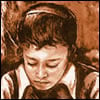As parents we know more than our children. We are older and wiser. We have more experience and this experience often makes us more practical, smarter in the ways of the world.
In our desire to help our children, we are often inclined to share this knowledge with them, to give them advice, or just tell them what we know when we think it will be helpful.
But when we reflect on our own lives we might find that receiving someone else's knowledge, being told of the wisdom of their experience, was not the most helpful. Instead, we preferred to discover truth for ourselves. And we appreciated those who aided in this process of discovery, rather than interrupted it.
As a parent we have many roles and many forms of relationship are possible with our children. Among them are teacher, guide and mentor; friend, ally, companion and support. We must delicately dance between being conduits of wisdom, authority and discipline, while remaining fountains of unconditional love, warmth and acceptance.
I believe these roles to be complimentary rather than contradictory. Being close with our children does not weaken our authority, developing friendship will not lessen respect, accepting them for who they are does not deny the opportunity for improvement. Rather, it is a matter of timing and discernment, judging each opportunity to determine which aspect of our relationship we wish to further and will be most beneficial at any given moment.
In our desire to teach and guide our children, we may too quickly pass over one essential step: knowing and accepting them for who they are, for how they perceive and make sense of the world around them. Without this step, we may find our efforts to educate and guide our children not only futile, but also engendering rebellion. Knowing and accepting our child for who he or she is, exploring with our children how they see the world, sharing a mutual sense of wonder about the many ways the world can be perceived and understood, will help our efforts at education and guidance and, at the same time, bring us and our child closer together.
Instead of viewing our children as empty vessels waiting to be filled, and ourselves as overflowing fountains of knowledge anxious to fill them, let us instead pretend for a moment that our children possess their own levels of knowledge and experience. And though we may not be empty vessels, let us at least be empty of preconceptions of who they are and what they know, and approach our children with genuine curiosity and a sense of wonder.
Children don't always make sense, yet there is usually some sense that underlies what at first glance may seem nonsense. If you as a parent believe this, then your conversation with your children will aim to uncover their sense, the meaning or logic that is hidden beneath their words. When you do this, you will be a part of a delightful adventure in discovering what and how your child thinks and makes sense of the world. And if you are able to do this without attempting to correct his or her thought, you will journey deeper and deeper into your child's reality as it is, and begin to know him for who he is, and begin to see the world as she sees it, regardless of whether this conforms to any adult sense of reality as you experience it.
Thus one key ingredient for this journey into the inner self of your child is a genuine curiosity about who he or she is. This curiosity is free of ulterior motive and comes both from caring about your child and by affirming that reality for both of you is more a matter of perception than a statement of fact. In other words, the world is what we make of it. What we see and think in reality often depends on the lens through which we each uniquely see the world.
You seek, simply, to catch a glimpse of the world through your child's lens. It will be a lens like no other. Each of us, child and adult alike, sees and makes sense of the world uniquely.
Will this build trust and closeness? Look at your relationships with those around you. In an accepting environment, with people who are genuinely curious about how we see the world and who encourage us to share our perceptions, who among us does not want to be forthcoming? More often than not, we are flattered by such attention, gratified that our views and opinions are sought after and valued.
Children are no different. They too will blossom in the light of your genuine curiosity and interest, in your acceptance and appreciation of their world-view. They will sense not only your interest and caring, but also how you are enriched by the privilege of sharing the worldview of another, especially the view of someone you love.
Will you be enriched? Most definitely. For one of the great delights of this journey of discovery is the gift of sharing another's world. It is as if you are given the ability to see the world through fresh eyes, to discover a world as authentic as your own, yet heretofore completely unknown to you. You are not discovering a child's world, you are discovering the world as experienced by your child. And it is as real as yours or as that of your husband, wife or best friend. It is as fresh as Rembrandt's, as far-reaching as Einstein's, as unusual as Van Gogh's, as terrifying and macabre as Edgar Allen Poe's. It has its own harmony and logic, if only you can suspend yourself long enough to hear and understand it.
A father relates:
Looking out the window, my son saw a tree whose branches were vigorously swaying back and forth.
"How does the tree move its branches like that?" he asked.
Without rising from my chair, nor shifting my eyes from my book, I started to answer, "The tree is not moving the branches, son. The wind is..." But before the words were out, I caught myself. Instead I rose from my chair and moved to the window to join my son. I looked at the tree. From inside our room, from behind the window, I could neither feel nor hear the wind. I saw instead a tree with its branches silently moving and thought to myself, from inside this room, how could I possibly be sure that the branches were moving because of the wind rather than from the trees own volition?
As I stood there with my son watching the tree, I became mesmerized by the movement of the branches, the shimmer of the leaves. My mind quieted and I became less sure myself of what was causing the branches to move. Was it the wind, or was it some expressive, independent movement of the tree?
"I see what you mean," I said to my son. "The movement of the tree is very beautiful."
"Do you think the tree is dancing?" asked my son.
"Why would it be dancing?" I asked.
"Maybe it is happy because the sun is shining," he said.
"Perhaps," I said.
"Or because it's spring," he added, "and it's not cold anymore."
"Perhaps," I said.
As we continued to watch the tree together, I, too, began to discern the dance of the tree. I enjoyed the movement and sway of the branches, seeing little nuances that I hadn't noticed before. There seemed to be a rhythm to the movement, first strong and forceful, then light and gentle, then more vigorous, sometimes nearly violent.
"Are trees alive?" my son asked.
Yes, I answered, they are alive.
"Do they feel things?" he asked.
"I don't know," I said. "Why do you ask?"
"Because this tree looks happy," he answered. "Can a tree be happy or sad?"
"What do you mean?" I asked.
"In the winter, trees seem sad," he said. "Their branches hang down, and they look cold and lonely. But now with the leaves on the tree and the sun shining and the birds flying, it looks happy."
"Let me look," I said.
Silently we looked out the window. I watched other trees and though they, too, were moving in the wind, each was moving in a different rhythm, and seemed to express something singular and unique in its movement. Not every tree was dancing.
"Look at that big oak tree over there," I said. "What do you think it is feeling?"
"It's happy too," he said. "But it's not dancing as much. I think because it is older, and maybe its branches are stiff. Or maybe it is not as excited by the sun and spring. It has met them too many times before and is used to them."
"Yes," I said, smiling inside.
By this time, I loved this tree. Or at least I was feeling so much love, that it was impossible for me to exclude the tree from my feelings. And I began to wonder whether the tree was causing these feelings in me? Or was the tree simply a catalyst, like the wind, that engendered a response in me, just as the wind engendered a response in the tree?
"Do you really think the tree is dancing?" I asked my son.
"I don't know," he answered.
"You don't know?" I asked, surprised at his sudden uncertainty.
"If it were dancing," he said, "it would need music."
"Oh, I see," I said. "It would need music."
And then he said,
"But maybe the music is in the wind. Maybe the wind carries a music that only the trees can hear."
"Yes, son," I said, "maybe the wind carries a music that only the trees can hear."
And I began to dream of scientists with ears and instruments to hear the music of the wind and who listen to its shifting harmony.
My son interrupted my thoughts.
"Dad?," he said.
"Yes, son."
"I don't really like my teacher at school."
And then we talked about this for a while, while standing by the window. And though I could not know for certain, I had the sense that the tree was now watching us and I wondered if we - the tree, my son, and I - shared the satisfaction of this moment.









Join the Discussion